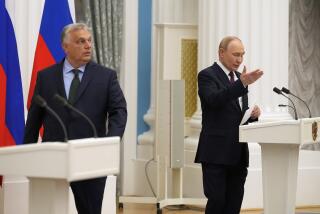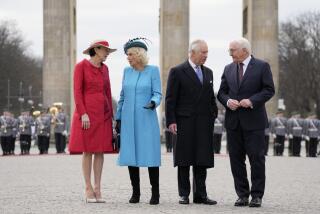Battle Royal Erupts Over Queen Rumor
- Share via
LONDON — An invitation for Queen Elizabeth II to visit Moscow, although only in the rumor stage, has nonetheless triggered a lively and multilevel political debate here that one government source has described as “totally out of control” and “a bit of a farce.”
The debate pits Prime Minister Margaret Thatcher against not only the rival Labor Party but some of her own Conservative members of Parliament as well. And it provides a peek both at Thatcher’s reputedly tense relations with the queen and at the controversial way in which the prime minister’s office briefs reporters, which one historian has described as “the longest-standing institutionalized racket in British journalism.”
The story began with Thatcher’s surprise announcement that Soviet President Mikhail S. Gorbachev will visit London on Dec. 12-14 on his way home from the United States and Cuba. Gorbachev and his wife, Raisa, were invited to lunch at Buckingham Palace, which would make him the first Soviet leader in more than 20 years to be received by the queen.
The next day, a report in the Evening Standard newspaper said Gorbachev intends to bring with him a formal invitation for the queen to become the first British monarch since the Bolshevik Revolution to visit Moscow. The report was written by Anthony Louis, a Soviet citizen whose journalist father, Viktor, has for years been considered a Kremlin conduit to the West.
Regular Friday Briefing
Immediately upon Thatcher’s return from her own U.S. visit last week, her press secretary, Bernard Ingham, held one of his regular briefings for a select group of political correspondents who write for major British Sunday newspapers. According to their weekend reports, which quoted “senior government sources,” Thatcher would oppose a royal trip to Moscow should such an invitation actually be made.
Under the British system, the prime minister has virtual veto power over such a state visit, since the queen is required to consult her ministers before accepting invitations from abroad.
The “government sources”--actually, spokesman Ingham--said that a major barrier would be the “butchering” of the Russian royal family, the Romanovs, after the 1917 Revolution, according to the British press reports. Czar Nicholas II was a first cousin of Britain’s King George V, and the czarina was a granddaughter of Queen Victoria.
Ingham was also reported to have said it would be wrong for the queen to visit Moscow until Gorbachev makes more dramatic moves to improve the level of human rights in the Soviet Union.
No sooner had the weekend reports circulated than Thatcher was attacked. In a thinly veiled reference to widely reported tension between the queen and her prime minister, George Robertson, the Labor Party foreign affairs spokesman, called it “sad and sour” for Thatcher to veto a visit that “could only encourage Gorbachev policies on reform.”
“The queen is being made a scapegoat for Mrs. Thatcher’s obsession with dominating the scene,” Robertson added.
Some of Thatcher’s fellow Tory members of Parliament demurred, however. “My own view about people with rather bad records in human rights is that they should be exposed to the beauty of a free society,” commented a former lord chancellor, Lord Hailsham, in a British Broadcasting Corp. interview. “The more you can expose them to it, the better things are likely to be.”
Peter Temple-Morris, another Conservative member of Parliament, said a royal visit to Moscow would be “a tremendous thing to happen” and added: “The big fear in the Soviet Union is that Gorbachev’s reforms will fail. A visit by the queen would be a marvelous encouragement to the Russian people.”
For her part, Thatcher, in remarks to Parliament on Tuesday, denied having advised the queen against going to Moscow. She said the matter had not been addressed in any way, and called it a “purely hypothetical” question.
The British press was divided on the issue.
The Daily Telegraph on Monday agreed with Ingham that “an early royal visit would seem to give our highest endorsement to a process which is just starting and by no means assured of success.” Gorbachev, the newspaper added, “must wait until he has a genuinely new Russia to show her majesty if he wants the support which a royal visit could give.”
‘Gloss’ on Political Decision
However, the Guardian scoffed that Thatcher’s spokesman was merely trying to put a gloss on a purely political decision.
“The affront, if any, to the memory of distant cousins was surely one for the queen to ponder herself,” the newspaper commented. “They were her cousins. She, admirably common-sensical, seemed utterly unfazed by the difficulty--until Mr. Ingham told her what to think.”
And the Independent expressed the opinion that Ingham’s arguments “show a curiously negative attitude to the significant changes taking place in the Communist world. . . . A Soviet invitation should be seen as a remarkable concession from a Communist regime to the validity of constitutional monarchy.”
Ingham’s office decried the whole affair Monday as a distortion by overeager journalists.
Briefings Called ‘Racket’
But historian Peter Hennessy, director of the Institute of Contemporary British History, was among the skeptics. Labeling the selective press briefings by 10 Downing St. a “racket,” Hennessy said in an interview that such government leaks through what he called the “absurd lobby system of briefing here” have been a key feature of national politics for more than a century.
It was no coincidence that the Guardian and the Independent carried critical editorials Monday, Hennessy added. Those are the primary newspapers that do not participate in Ingham’s supposedly off-the-record Friday briefings--an institution that the Independent terms the “Friday fishing fleet.”
As to the royal invitation, the weekend brouhaha here seems to ensure that it will remain unproffered--if it was ever planned in the first place.
More to Read
Sign up for Essential California
The most important California stories and recommendations in your inbox every morning.
You may occasionally receive promotional content from the Los Angeles Times.













